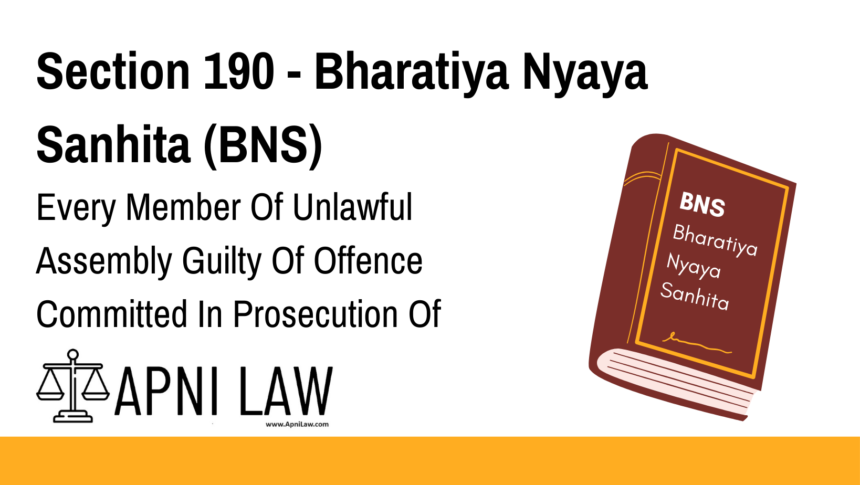Code : Section 190 BNS
If an offence is committed by any member of an unlawful assembly in prosecution
of the common object of that assembly, or such as the members of that assembly knew to be
likely to be committed in prosecution of that object, every person who, at the time of the
committing of that offence, is a member of the same assembly, is guilty of that offence.
Explanation
Section 190 of the Bharatiya Nyaya Sanhita, 2023, makes every member of an unlawful assembly criminally liable for any offence committed:
- In furtherance of the common object of the assembly, or
- Which the members knew was likely to be committed
This provision is based on the principle of “vicarious liability” where the act of one is treated as the act of all, if done in pursuit of their common unlawful objective.
The purpose is to discourage people from being part of any such gathering.
Essential Elements
For Section 190 BNS to apply:
- There must be an unlawful assembly as defined under 👉 Section 189 BNS – Unlawful Assembly
- An offence must have been committed by any member of that assembly.
- The offence must be:
- In prosecution of the common object, or
- Such that members knew it was likely to be committed.
If these conditions are fulfilled, every member present at the time becomes guilty of that offence, even if they did not personally participate in it.
Punishment
The punishment will be the same as prescribed for the offence committed in prosecution of the common object.
For example:
- If murder is committed → Punishment under 👉 Section 103 BNS – Punishment for Murder
- If mischief is committed → Punishment under respective Mischief sections
There is no separate punishment prescribed under Section 190; rather, it imposes constructive liability.
Illustration
If an unlawful assembly of five persons gathers to forcibly occupy someone’s land and one member of the group commits murder during this act, all members of that assembly will be held guilty of murder under Section 190 if it is proved that:
- Murder was committed in prosecution of their common object, or
- They knew such an offence was likely to happen.
Common Questions & Answers
- Can a person be punished even if he did not physically commit the offence? ✅ Yes, if he was a member of the unlawful assembly at the time and the offence was committed in prosecution of the common object.
- Is prior knowledge enough to convict under Section 190? ✅ Yes, if the member knew that the offence was likely to be committed.
- What is the difference between Section 190 and criminal conspiracy? 👉 Section 190 applies to spontaneous assembly with a common object, while conspiracy requires prior agreement to commit an offence.
Related Sections (Internal Links)
- 👉 Section 189 BNS – Unlawful Assembly
- 👉 Section 191 BNS – Rioting
- 👉 Section 106 BNS – Right Of Private Defence Against Unlawful Assembly
Conclusion
Section 190 BNS ensures that members of an unlawful assembly cannot escape liability by claiming that they did not personally commit the offence. If the offence was committed to fulfill their common objective, each member is equally responsible.
For detailed and structured legal information, visit 👉 ApniLaw.com








